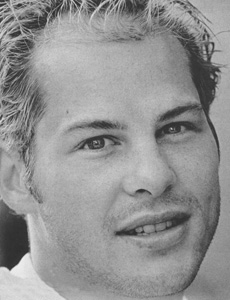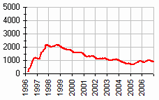Гонщики, V | |
Villeneuve, Jacques Курсивом отмечены гонщики, |
| Жак ВильнёвVilleneuve, Jacques |
 (c) 'Who is Who' by Steve Small, 2000 Родился: 09.04.1971 Сен-Жан-сюр-Ришелье, Шабли, Квебек Сезонов в Ф1: Лет в Ф1: 11 Гран При: Старты: 163* *не стартовал: 2 Победы: - подряд: 2 Подиумы: - подряд: 7 Поул-позиции: - подряд: 5 Первый ряд: - подряд: 8 Быстрые круги: - подряд: 3 Лучший финиш: Лучший старт: 1 Дубли: Хет-трики: 2 Лидирование старт/финиш: Большие шлемы: Круги: - лидирования: 633 Километры: - лидирования: |
Год | Команда | Шасси |
The modern-day racing driver is an incredibly glamorous figure in a sport where image is everything. Yet F1's corporate culture and the hawkish nature of some sections of the media have now perhaps turned these superstars into comparatively bland individuals whose thoughts and opinions are screened and shaped before being made public via non-controversial press releases or media conferences. Whether naturally or by intention, the one man who stands out as the exception to the stereotype on all counts is Jacques Villeneuve. His grunge look, complete with bleached hair, appeals to the younger pop-culture generation and his outspoken views on Formula 1 have caused agitation within the portals of the FIA. Indeed young Master Jacques' maverick streak got him into hot water back in 1997 when he criticised the new technical regulations in his own inimitable style.
Being the son of such a legendary father naturally helped Jacques to get his fledgling career off the ground, but after a none-too-impressive three seasons spent in Italian Formula 3 between 1989 and 1991 it seemed that his 'name' was greater than his talent. However, he was soon to prove the doubters wrong when a move to Japan to race in Formula 3 saw him score three victories and take second place in the series. Luck can play a huge part in the shaping of any driver's career and in Villeneuve's case it came in the form of an invitation to compete in the 1992 Player's Trois Rivieres race in Quebec. Then an unknown quantity, Jacques took a fine third place and his new mentor Craig Pollock set in motion a deal for him to race in Formula Atlantic full-time in 1993.
The young French-Canadian fought out a three-way battle for the title but, despite seven poles and five wins from fifteen starts, made just a few errors too many and came up short. Crucially, though, Jerry Forsythe and Barry Green decided Jacques was the driver to stick with when they made the move up to the Indy Car championship in 1994. Villeneuve took to the series like a duck to water, and winning a race at Elkhart Lake and finishing a very close second in the Indy 500 contributed to an impressive sixth place in the final standings. The destination of the 'Rookie of the Year' award was a foregone conclusion. Things were to get even better the following year, as Jacques not only became the youngest-ever PPG Cup champion but also scooped the Indy 500 after being two laps down at one stage. His stock was at its highest, and astutely Villeneuve and Pollock decided that the chance of a dream move to Formula 1 with Williams-Renault for 1996 was much too good to pass up.
Jacques blew into the new F1 season like a full-force gale. He could easily have won his maiden Grand Prix in Australia and as the season progressed he grew an ever-stronger threat to Damon Hill. In fact he came closer to beating his more experienced team-mate than the final points table showed. Crucially, Villeneuve's performances convinced the Williams management that they could dispense with the services of their loyal stalwart and put their faith in the bouncy, self-assured enfant terrible.
Villeneuve duly delivered in 1997 when, with a cocktail of brilliance and some notable gaffes (both on and off track) he squared up to the challenge of Michael Schumacher and Ferrari, and slugged it out right up to the thrilling finale at Jerez, where the German attempted his outrageous blocking manoeuvre. To win the World Championship is hard enough in itself, but to achieve such a feat in only his second year in F1 was a truly remarkable performance. Jacques had to win the title that season, for with Renault pulling out of racing Williams knew they would no longer be the leading force of yore.
In 1998 Jacques hustled the garishly liveried Williams FW20 for all it was worth, often placing it above quicker cars. After spending the previous two seasons eyeing up the silverware, the French-Canadian's expectations were now lowered to a scramble for points-scoring finishes and the odd podium placing. If nothing else, it proved Villeneuve's calibre as a top-notch performer, with an added bonus being his realistic acceptance of the position Williams were in.
Certainly Patrick Head would have liked to hold on to Jacques for a fourth year, but the attraction of the British American Racing project headed up by his mentor Craig Pollock was irresistible. Of course, history now records that the first year for the cocksure new team was one of self-inflicted humiliation as the acquisition of even a single World Championship point proved beyond them. In fairness to Villeneuve, he extracted the very maximum from the car, which on a number of occasions was quite useful. Crucially, he never became disheartened, always gave 100 per cent commitment and absolutely never gave up trying - the qualities of a champion who will surely be back among the winners again.
(c) 'Who is Who' by Steve Small, 2000
| © WildSoft, 1995-2020 |



